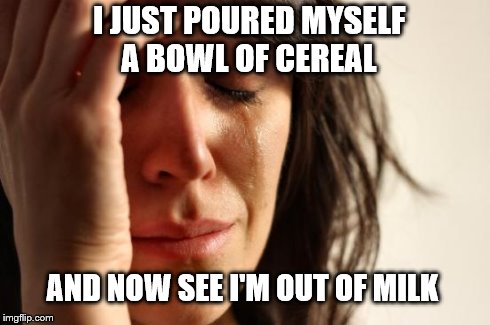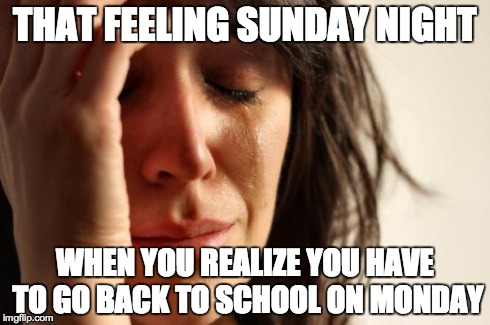Ever have that type of day
were nothing was going your way? Like pouring yourself a bowl of cereal and
seeing you are out of milk or when you put on your winter jacket and your
sweater sleeves get bunched up? How did those types of events make you feel? Angry?
Annoyed? Upset? What if I told you, you were having a First World Problem.
First World Problems are frustrations and complaints that are only experienced
by individuals who are more privileged normally living wealthy countries. First
World Problems are usually used as a tongue in cheek comedic device to make
light of trivial inconveniences.
 I have always liked this meme for its tongue in cheek
humor since I, like most people, have had problems like when we were discussing
this blog assignment and I was writing notes about it, I realized something. My
brand new watch I got for Christmas seemed to be getting a little dirty due to
the light color of the leather wristband. I looked my wrist and sighed thinking
I would now have to look up a way to clean my watch after class. Then it clicked;
I was having a First World Problem.
I have always liked this meme for its tongue in cheek
humor since I, like most people, have had problems like when we were discussing
this blog assignment and I was writing notes about it, I realized something. My
brand new watch I got for Christmas seemed to be getting a little dirty due to
the light color of the leather wristband. I looked my wrist and sighed thinking
I would now have to look up a way to clean my watch after class. Then it clicked;
I was having a First World Problem.
The first known case of a First World Problem would be
from the Canadian alternative rock band named Matthew Good Band. The band came
out with a song called “Omissions of the Omen” from their 1995 album Last of the Ghetto Astronauts. The
lyrics of the song are “And somewhere around the world / Someone would love to
have my first world problems” The song showcases how the First World Problem is
something that someone who doesn’t live in a first world would rather have the
problems you face everyday then the ones they have. The problems they face
would be far more severe such as poverty or famine. Ten years later in 2005,
Urban Dictionary added the term First World Problem into their database.
The First World Problems meme resonates differently with
different audiences. As Americans, we see it as something humorous and
relatable. Other countries, especially those less fortunate, will see the meme
as a silly and stupid thing people should care about. They should care about
real problems in the world like Ebola or human trafficking. Some people would state how people should "shut up" about their First World Problems. The audience this
meme would work best for is an American audience. It would be catering to an
audience who has all these things that happen to them such as if two of your
favorite TV shows were on at the same time and you can’t decide which one to
watch.

Great work here - very nice job of digging into the history of the phrase. I also appreciate how you've identified the "memes on the theme" as it were.
ReplyDeleteDo a bit more to unpack the sharpness of the caption. These memes are less about the image and more about the cutting text. These are less a poke at silly problems and more a reminder that people who have such concerns are self-absorbed whiners in a world that could use some attention.
Good start here! Keep working!